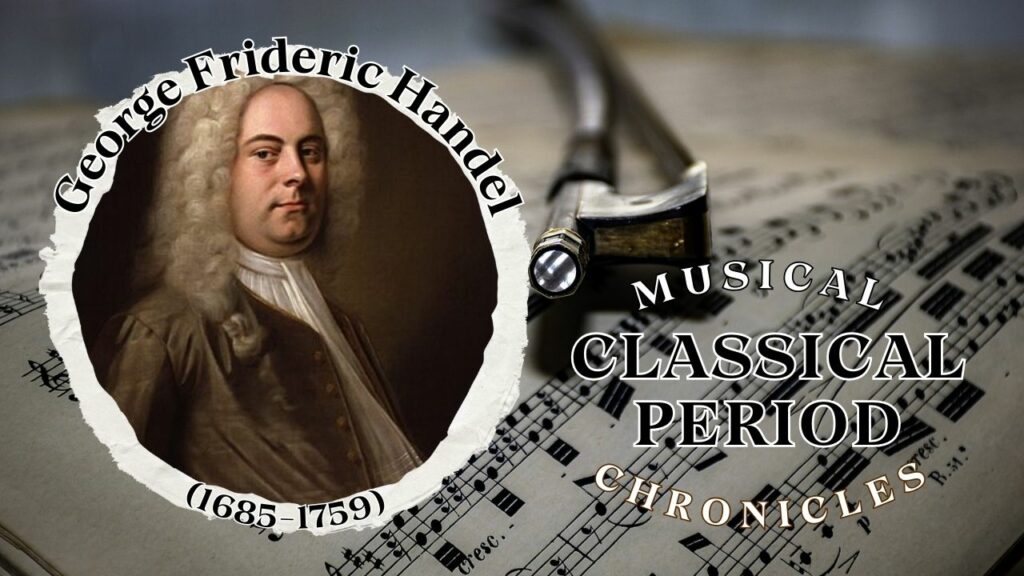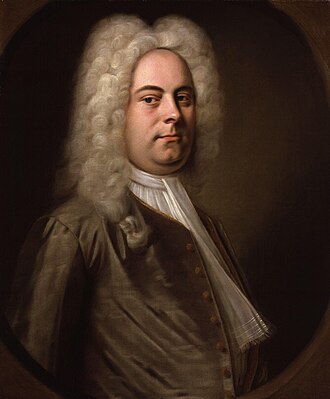
George Frideric Handel (1685-1759)
The Dueling Composers – Handel’s Rivalry with Domenico Scarlatti
Surrounded by the opulent tapestry of 18th-century London, where the echoes of classical music resonated through the cobbled streets, a gripping tale unfolded—a symphonic clash between two maestros, George Frideric Handel and Domenico Scarlatti. The air buzzed with anticipation as the renowned composers prepared to engage in a musical duel that would transcend notes and crescendo into a legendary rivalry.
Handel, the esteemed court composer, and Scarlatti, the virtuoso harpsichordist, found themselves entangled in a web of artistic competition that extended beyond the concert halls and into the very soul of their compositions. The streets of London became a stage for their musical joust, each note a thrust, and every chord a parry in this duel for supremacy.
The clash between Handel and Scarlatti wasn’t merely a contest of skill; it was a battle of artistic ideologies, a contest to determine whose musical prowess would shape the future of the era. The city awaited the crescendo of this rivalry, oblivious to the deeper currents beneath the surface—personal ambitions, creative fervor, and the unspoken desire to compose a masterpiece that would stand the test of time.
As the stage was set for this musical showdown, the audience, both aristocratic and common folk alike, became unwitting spectators of a drama that transcended melody and ventured into the realm of artistic legacy. The streets of London brimmed with whispers, the anticipation palpable, as the duel between Handel and Scarlatti promised to be a symphony of intrigue, jealousy, and unparalleled musical brilliance.
Little did they know that within the harmonious notes played by these dueling composers lay a story of artistic passion, a tapestry woven with the threads of rivalry that would etch their names into the annals of musical history. The duel had begun, and the city held its breath, caught in the spellbinding cadence of the impending clash between two titans of the Baroque era.
Handel’s Overture: The Unraveling Composition of a Maestro

George Frideric Handel, a luminary of the Baroque era, was born into a world where the language of music spoke to the hearts and souls of those who listened. His early years, marked by an insatiable passion for melody, paved the way for a career that would reverberate through the annals of musical history.
Born in Halle, Germany, in 1685, Handel exhibited an extraordinary affinity for the keyboard from a tender age. His father, recognizing the prodigious talent within his son, permitted young George to explore the realms of musical composition. Handel’s love for the organ blossomed into an undeniable gift, earning him recognition far beyond his hometown.
Handel’s journey led him to Italy, a crucible of artistic fervor, where he absorbed the rich influences of Italian opera. The vibrant streets of Florence and Rome provided a backdrop for the maturation of his artistic sensibilities. It was within the splendor of Italian baroque that Handel honed his craft, crafting compositions that bore the indelible mark of his newfound inspiration.
The maestro’s return to Germany heralded the composition of his first opera, “Almira,” a resounding success that marked the beginning of Handel’s ascent to musical eminence. His insatiable curiosity led him to England, where he endeared himself to audiences and patrons alike. The bustling streets of London became a stage for Handel’s genius, with operas, oratorios, and concertos flowing from his pen with unmatched fervor.
However, as the maestro’s star ascended, an undercurrent of turmoil brewed beneath the surface. Financial pressures and the relentless pursuit of artistic perfection strained Handel’s spirit. The weight of expectation, both from society and himself, pressed down upon him, threatening to extinguish the very flame that fueled his creative brilliance.
Handel, despite his illustrious career, found himself entangled in a web of financial woes. The opulent productions that defined his oeuvre came at a steep cost, and the maestro’s pockets were not impervious to the strains of economic hardship. The glittering success of his operas belied a harsh reality – the composer, immersed in the grandeur of his compositions, was grappling with the harsh realities of debt.
The burdens of financial strain were compounded by Handel’s declining health. The toll of a life dedicated to the pursuit of artistic excellence manifested in physical frailty, a testament to the sacrifices made in the name of music. Yet, even in the face of adversity, Handel remained resolute, his passion undiminished by the challenges that sought to undermine his creative spirit.
As the world marveled at the maestro’s musical tapestry, woven with threads of triumph and tribulation, Handel pressed on, determined to leave an indelible mark on the world of Baroque music. Little did he know that a shadow loomed over his compositions, threatening to tarnish the very legacy he sought to etch in the annals of musical history. The Harmonic Heist had cast its dark shadow, and Handel’s symphonies stood at the precipice of an uncertain fate.
The Harmonic Heist Unveiled
We interrupt this program for an important announcement.
In a stunning revelation that echoes through the hallowed halls of Baroque music, a clandestine plot has been laid bare, threatening the very essence of musical creativity. Recent investigations have brought to light a shocking conspiracy to pilfer the masterpieces of revered composers, an audacious scheme masterminded by an enigmatic figure known only as the “Musical Forger.”
The orchestration of this plot is as elaborate as a finely tuned symphony. It targets the oeuvres of none other than George Frideric Handel and Domenico Scarlatti, luminaries of the Baroque era. These composers, celebrated for their unique contributions to the musical tapestry, now find themselves unwitting victims in a sinister act of artistic thievery.
Details remain scarce, but preliminary reports suggest a meticulous operation, with the Musical Forger infiltrating the inner sanctums of musical creation. The perpetrators, shrouded in the shadows, have managed to steal and replicate compositions with an uncanny precision that challenges even the most discerning ear. As the musical community grapples with the implications of this audacious heist, the city’s once harmonious atmosphere is now tinged with suspicion and uncertainty.
Authorities are scrambling to apprehend those responsible and salvage the integrity of Baroque music. The very essence of artistic expression hangs in the balance, as composers and patrons alike reel from the realization that their beloved compositions may have been compromised. The question on everyone’s lips: Who is the Musical Forger, and what other symphonies are at risk of being ensnared in this web of deceit?
As the investigation unfolds, the city’s cultural landscape is in upheaval, and the once joyous melodies that filled the air are now drowned in a dissonant note of suspicion. The Harmonic Heist has cast a dark shadow over the world of Baroque music, leaving audiences and musicians alike to wonder if the harmonies they hold dear will ever be the same again.
Now back to the program.
Harmonies Unveiled: Handel’s Symphony of Triumphs and Tribulations
Behind the tumultuous backdrop of Handel’s life, the relentless pursuit of artistic brilliance intertwined with the challenges of an ever-changing world. The cacophony of London’s streets resonated with the echoes of Handel’s compositions, each note carrying the weight of a maestro’s ambition.
The resounding success of Handel’s “Water Music” reverberated through the riverbanks of the Thames, a testament to the composer’s ability to transcend the confines of tradition. His oratorios, including the iconic “Messiah,” captivated audiences, weaving tales of divine inspiration that mirrored the complexities of his own existence.
Yet, the maestro’s prolific output belied the turmoil within. Handel’s financial struggles, often concealed behind the opulence of his productions, painted a contrasting picture of the esteemed composer. The grandiosity of the Royal Fireworks Music, performed betwixt the splendor of a pyrotechnic display, concealed the quiet desperation of a man burdened by debts.
Handel’s collaborations with librettist Charles Jennens resulted in masterpieces that explored the profound depths of human emotion. The poignant strains of “Lascia ch’io pianga” from the opera “Rinaldo” bore witness to Handel’s ability to evoke visceral responses, transcending the boundaries of language and culture.
As the curtain fell on each opera, the maestro’s life unfolded in a crescendo of triumphs and tribulations. The intricacies of his relationships, from the patronage of Queen Anne to the rivalry with Italian composer Giovanni Bononcini, added layers to the narrative of Handel’s existence. His encounters with fellow luminaries, including Bach and Scarlatti, enriched the tapestry of his musical journey.
Handel’s enduring legacy extended beyond the confines of the concert hall. His philanthropic endeavors, notably the establishment of the Foundling Hospital, demonstrated a compassionate dimension to the maestro. The intertwining threads of his personal and professional life painted a nuanced portrait of a man whose indomitable spirit navigated the complexities of the 18th-century musical landscape.
The maestro’s later years, marked by declining health and the loss of vision, did little to quell the fervor of his creative pursuits. Handel, despite the encroaching darkness, continued to compose with unwavering determination. His oratorio “Jephtha,” penned in the twilight of his career, mirrored the biblical themes of sacrifice and resilience, echoing the maestro’s own journey.
As Handel’s final notes echoed through the corridors of time, his influence persisted, shaping the trajectory of Western classical music. The harmonies he forged and the emotions he elicited from his compositions became immortal fragments of a legacy that transcended the mortal confines of its creator.
The Harmonic Heist, the looming shadow that had threatened to tarnish Handel’s legacy, receded into the annals of history. The maestro’s symphonies, now liberated from the shackles of financial strife and personal tribulations, stood as testaments to the enduring power of artistic expression.
With the final strains of Handel’s “Hallelujah Chorus” echoing in the collective consciousness, the curtain fell on the Baroque era. Yet, as one chapter concluded, another awaited, beckoning with the promise of new compositions and the resonance of unseen melodies. The departure of Handel marked not an end but a transition, a bridge to the opulent landscapes of the Classical period, where the melodies of Mozart, Beethoven, and Bach awaited their turn in the grand tapestry of musical history.
Handel’s Final Crescendo and the Prelude to Cimarosa’s Overture
Rebounding from the echoes of Handel’s legacy, a symphony of triumphs and tribulations, the maestro bid his farewell. As the curtain descended on his life’s opus, the musical world was left with the resounding chords of his genius. Handel’s compositions continued to enchant audiences across centuries, his enduring melodies woven into the rich tapestry of musical history.
The aftermath of Handel’s departure saw his works persisting in the collective consciousness, performed in grand concert halls and intimate settings alike. The majestic strains of “Messiah” echoed through the corridors of time, forging an immortal connection between composer and listener.
Yet, behind the scenes, financial woes had been the persistent undertone of Handel’s illustrious career. The intricate dance between patronage and creative independence had often led him to the precipice of destitution. As the final notes of his life’s composition faded, a subtle reminder lingered – the complex relationship between art and financial stability.
In the wake of Handel’s departure, the musical world found itself at a crossroads, teetering between tradition and innovation. The ever-changing landscape of composition, performance, and patronage begged the question: Could the pursuit of art coexist harmoniously with financial pragmatism?
The baton now passes to a new conductor, Domenico Cimarosa, waiting in the wings to craft his own harmonious narrative. The stage is set, the audience anticipates, and the orchestra tunes for the next movement. Join us as we step into the vibrant world of Cimarosa, where melody meets destiny in an orchestration of life and music.
Return to the Classical Period Chronicles home page.
